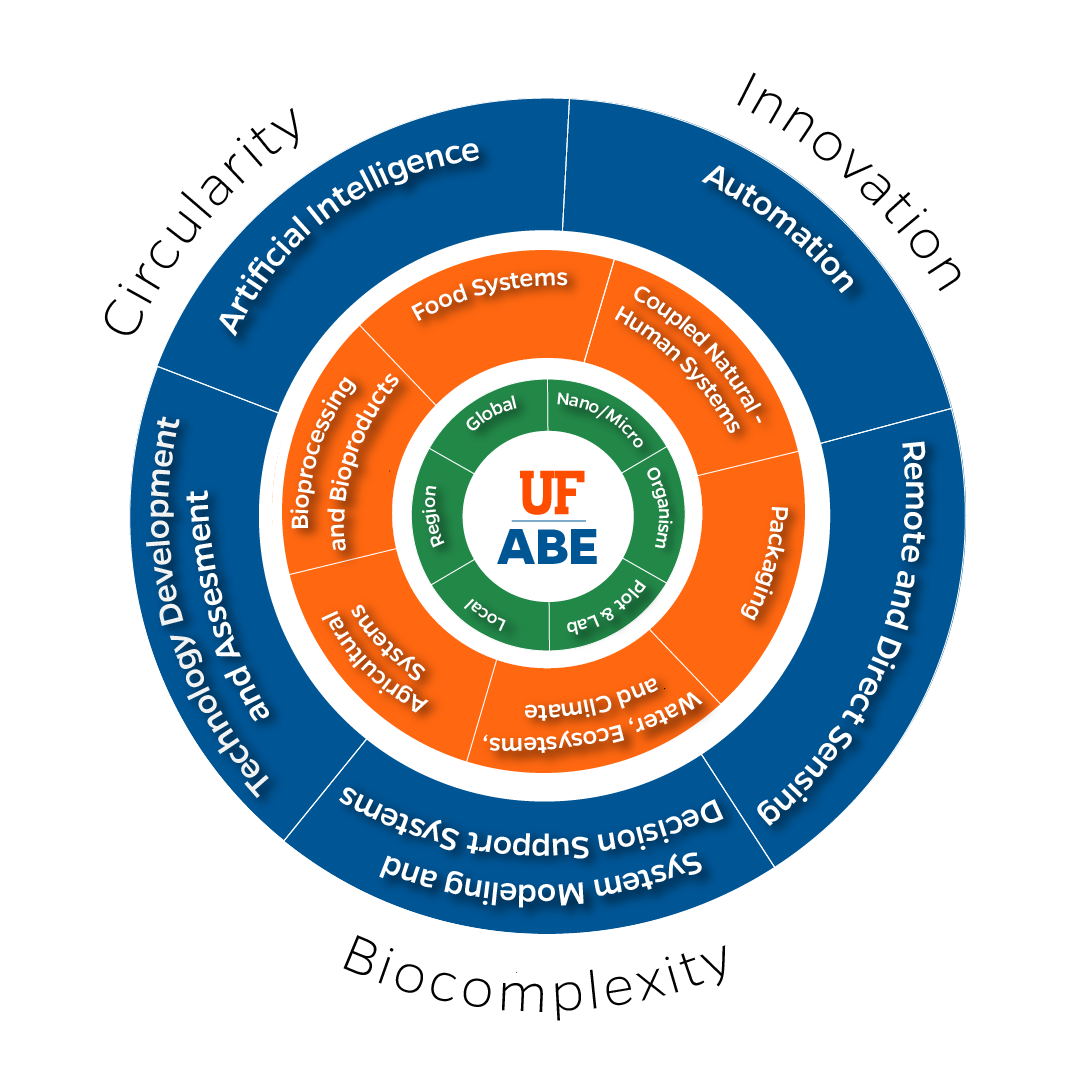
Over the past year, faculty in the department have had multiple discussions and a retreat about how we represent our research to others. Our research programs are complex, multidisciplinary, and typically have spatial and temporal components. The question was how to showcase this in a way that is inclusive of our expertise but also manageable to read or visualize by a broad audience of students, stakeholders, and other professionals.
This graphic shows the over-arching themes in our research programs: circularity, innovation, and biocomplexity. The blue circle represents the different approaches we apply, while the orange circle provides the domains. The inner circle represents the different spatial scales of ABE research. Each can rotate independently showcasing the tricomplexity and different pairing among the 3 variables.
Agricultural and Biological Engineering (ABE) research focuses on the design and assessment of innovative solutions towards more sustainable living systems and their components, processes, and interactions. Whether natural or engineered, these bio-complex systems can operate from the nano/cellular to global scales. The goal of research conducted at ABE is to design system solutions that promote greater circularity and sustainability considering economics -- research at ABE therefore integrates multidisciplinary teams and cuts across several domains and areas of specialization. Considering the broad nature of the ABE program, here are a few domains that ABE research includes:
- Agricultural systems –includes controlled environments, field and specialty crops, animal systems, and agronomic management.
- Bioprocessing & bioproducts –includes anaerobic digestion, biofuel production, bioplastics with a focus on waste reduction and reuse of byproducts.
- Food systems – includes components related to food preproduction/production phases (process food and fresh horticultural products), packaging, transportation and distribution, waste reuse, and life cycle considerations.
- Coupled natural-human systems – includes human impacts on natural systems (such effects of land management on climate and nutrient & water cycles) and the impacts of natural systems on humans, and their responses to change (e.g., natural disasters, socially driven disasters).
- Packaging – includes research on extending shelf life, preserving the nutritious value of foods, food and non-food material safety, improving end-of-lifecycle outcomes for packaging materials, new innovative material variants and other byproducts of the packaging process.
- Water, ecosystems, and climate – includes all components of the hydrologic cycle and different land use types; agrochemical and nutrient transport; includes green infrastructure, stormwater management and control, engineering urban soils for greater ecosystem function, ecosystem services; includes climate variability, climate change, and weather quantification, trend identification, and forecasting.
Different approaches are applied by ABE researchers in these domains, including Artificial Intelligence (AI); automation; remote and direct sensing; systems modeling and decision support systems; and technology development and assessment.
Faculty By Domain
-
Agricultural Systems
- Yiannis Ampatzidis
- Hiamanote Bayabil
- Nikolay Bliznyuk
- Daeun (Dana) Choi
- Melanie Correll
- Michael Dukes
- Clyde Fraisse
- Sandra Guzman
- Young Gu Her
- Dan Hofstetter
- Gerrit Hoogenboom
- Daniel Lee
- Charlie Li
- Henry Medeiros
- William Pelletier
- Richard Scholtz
- Vivek Sharma
- Vakhtang Shelia
- Sanjay Shukla
- Aditya Singh
- Xu (Kevin) Wang
- Adam Watson
- Ziwen Yu
- Ying Zhang
- Bioprocessing & Bioproducts
- Food Systems
- Coupled Natural-Human Systems
- Packaging
-
Water, Ecosystems, and Climate
- Yiannis Ampatzidis
- Haimanote Bayabil
- Eban Bean
- Nikolay Bliznyuk
- Michael Dukes
- Clyde Fraisse
- Sandra Guzman
- Young Gu Her
- Gerrit Hoogenboom
- Ana Martin-Ryals
- Rachata Muneepeerakul
- Rafael Munoz-Carpena
- Richard Scholtz
- Vivek Sharma
- Vakhtang Shelia
- Sanjay Shukla
- Aditya Singh
- Xu (Kevin) Wang
- Ziwen Yu
- Ying Zhang
Useful Links
- IFAS Research and Extension
The Solutions For Your Life website provides information 24/7 on a wide variety of topics including agriculture, the environment, families and consumers, disaster preparedness, lawns & gardens and more. Search the EDIS publication database for information on a wide variety of topics. - Research Centers
Faculty in the ABE department participate in research efforts with a number of centers located both on and off the UF Campus.
